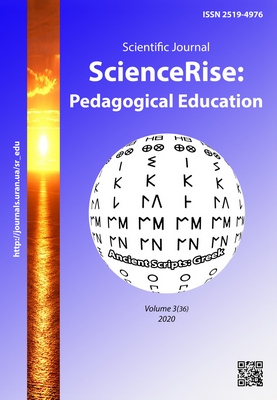Workshop as a method of training future experts in techogenic and environmental safety
DOI:
https://doi.org/10.15587/2519-4984.2020.200263Keywords:
workshop, innovative teaching methods, educational process, technogenic and environmental safety specialistsAbstract
The article contains the results of the research in the field of application of the workshop in training future technogenic and environmental safety specialists. The urgency of the method in the context of training competent and competitive specialists in the Ukrainian labor market has been proved. As a result of the research, the main components of the workshop have been identified and characterized as a method of practice oriented training of specialists. It has been determined, that the process of creating a workshop on the topic "Emergency Monitoring" should consist of three subsystems: preparatory and target, organizational and methodical, analytical and prеdictive. Its main methodological components have been presented.
We have developed the workshop on "Emergency Monitoring" for future specialists in specialty 183 "Environmental Technologies". The purpose is to create an emergency monitoring system on the example of a certain object and to develop possible scenarios for preventing and eliminating the consequences of an accident. It has been proved, that the workshop method will provide students with the opportunity to apply the previously acquired knowledge and skills in environmental monitoring and environmental safety. In addition, this method will provide students with the analysis of possible emergency scenarios in a particular region. It will help to create a system of crisis monitoring of the environmental components as well as to develop practical guidelines for an accident response and prevention. It has been determined, that during the workshop, the invited stakeholders have the opportunity to find employees. It has been proved, that training technogenic and ecological safety experts, using the workshop, ensures training of competent and competitive specialists, ready to work for specific domestic employers, whose cases have been worked upon during the classes. In future it will stop the outflow of specialists from Ukraine
References
- Subramanian, D. V., Kelly, P. (2018). Effects of introducing innovative teaching methods in engineering classes: A case study on classes in an Indian university. Computer Applications in Engineering Education, 27 (1), 183–193. doi: http://doi.org/10.1002/cae.22067
- Voitovska, O., Tolochko, S., Bordyug, N. (2018). Lifelong Learning in Modern Strategies of Sustainable Development. Studia warmińskie, 55, 343–352. doi: http://doi.org/10.31648/sw.3081
- Sivarajah, R. T., Curci, N. E., Johnson, E. M., Lam, D. L., Lee, J. T., Richardson, M. L. (2019). A Review of Innovative Teaching Methods. Academic Radiology, 26 (1), 101–113. doi: http://doi.org/10.1016/j.acra.2018.03.025
- Pearce, J. (2019). Teaching Science by Encouraging Innovation in Appropriate Technologies for Sustainable Development. Available at: https://hal.archives-ouvertes.fr/hal-02120521/
- Pometun, O., Pyrozhenko, L. (2002). Interaktyvni tekhnolohii navchannia: Teoriia, dosvid. Kyiv: A.P.N., 136.
- Sorochan, T. M., Skrypnyk, M. I. (2016). Tekhnolohii profesiinoho rozvytku pedahohiv: metodychnyi poradnyk. Kyiv, 231.
- Skrypnyk, M. I. (2013). Interaktyvni tekhnolohii v pisliadyplomnomu navchanni. Kyiv, 232.
- Maikovska, V., Yurko, I. (2019). Workshop as a tool of practical-based education and as a methodological and technological mean of entrepreneurial competence formation. Youth & market, 2 (169), 116–122. doi: http://doi.org/10.24919/2308-4634.2019.162832
- Pysareva O. «Workshop» kak novyi vyd effektyvnohoobuchenyia. Sovety professyonalnoho psykholoha. Available at: https://pisareva.by/workshop-kak-novyj-vid-effektivnogo-obucheniya/
- Bordiuh, N. S. (2019). Teoretychni i metodychni osnovy pidhotovky fakhivtsiv pryrodookhoronnoi haluzi do ekolohichnoho monitorynhu u systemi pisliadyplomnoi osvity. Kyiv, 472.
- Bordiuh, N. S. (2018). Strukturno-funktsionalna model formuvannia profesiinykh kompetentnostei iz monitorynhu dovkillia u fakhivtsiv ekolohichnoho spriamuvannia. Pedahohichni nauky, 1 (82), 95–99.
Downloads
Published
How to Cite
Issue
Section
License
Copyright (c) 2020 Natalia Bordiug, Anastasiia Rashchenko

This work is licensed under a Creative Commons Attribution 4.0 International License.
Our journal abides by the Creative Commons CC BY copyright rights and permissions for open access journals.
Authors, who are published in this journal, agree to the following conditions:
1. The authors reserve the right to authorship of the work and pass the first publication right of this work to the journal under the terms of a Creative Commons CC BY, which allows others to freely distribute the published research with the obligatory reference to the authors of the original work and the first publication of the work in this journal.
2. The authors have the right to conclude separate supplement agreements that relate to non-exclusive work distribution in the form in which it has been published by the journal (for example, to upload the work to the online storage of the journal or publish it as part of a monograph), provided that the reference to the first publication of the work in this journal is included.







